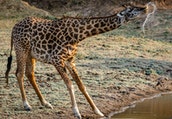- 1. Africa Okapi Appearance: The Okapi resembles a combination of a giraffe and a horse. It has a dark reddish-brown coat with zebra-like stripes on its hindquarters and legs. The front legs are white, and it has a long, prehensile black tongue, similar to that of a giraffe.
- 2. Africa Okapi Size: Adult Okapi stand about 5 to 6 feet (1.5 to 1.8 meters) tall at the shoulder. They have a body length of around 6 to 9 feet (1.8 to 2.7 meters) and a tail length of about 12 to 16 inches (30 to 40 centimeters). Adult Okapi typically weigh between 440 to 770 pounds (200 to 350 kilograms).
- 3. Africa Okapi Habitat: Okapi are found in the dense tropical rainforests of the Democratic Republic of the Congo in Central Africa. They primarily inhabit the Ituri Forest, which is a part of the Congo Basin.
- 4. Africa Okapi Behavior: Okapi are solitary and elusive animals, making them challenging to spot in the wild. They are primarily active during the day and are known for their keen senses and ability to detect danger.
- 5. Africa Okapi Diet: Okapi are herbivores and primarily feed on leaves, fruits, grasses, and other plant materials found in the rainforest.
- 6. Africa Okapi Unique Characteristics: The Okapi is often referred to as the "forest giraffe" due to its long neck and similar body shape. However, unlike giraffes, both male and female Okapi have ossicones, which are short, bony, horn-like structures on their heads.
- 7. Africa Okapi Conservation Status: The Okapi is classified as "Endangered" by the International Union for Conservation of Nature (IUCN). Their population is threatened by habitat loss, poaching, and civil unrest in their native range.
- 8. Africa Okapi Elusive Nature: Due to their solitary and elusive behavior, Okapi were relatively unknown to the Western world until the early 20th century. They were first described by scientists in 1901.
Africa Okapi
The Okapi (Okapia johnstoni) is a unique and fascinating animal found in the dense rainforests of Central Africa. Visitors interested in seeing Okapi in their natural environment can visit designated protected areas and reserves in the Democratic Republic of the Congo, such as the Okapi Wildlife Reserve.
Africa Safari Tour Book online The Okapi safari
Here is some information about the Okapi:
Africa Okapi Safari Tour
An Africa Okapi safari tour is a unique and exclusive experience, as the Okapi is a rare and elusive animal found in the dense rainforests of the Democratic Republic of the Congo. Due to their solitary and secretive nature, observing Okapi in the wild can be challenging, and specialized tours are limited.
By planning ahead and choosing reputable safari operators or guides, An Okapi safari tour is a once-in-a-lifetime experience, offering a rare chance to witness one of Africa's most enigmatic and elusive creatures.
Here are some key points to consider when planning an Okapi-focused safari tour:
Africa Okapis Safari Destinations
The Okapi is primarily found in the Ituri Forest, which is part of the Okapi Wildlife Reserve in the northeastern region of the Democratic Republic of the Congo. This area is the main habitat for Okapi and offers the best chance of encountering them in the wild.
Africa Okapi Specialized Tours
Specialized Tours: Due to the remote location and challenging logistics of visiting the Okapi Wildlife Reserve, specialized tours may be organized by reputable safari operators with experience in the region. These tours typically focus on tracking and observing Okapi in their natural habitat.
Africa Okapi Local Guides
Local Guides: Engage experienced local guides who are knowledgeable about the Okapi's behavior and the rainforest environment. Local guides are essential for navigating the dense forest and increasing your chances of spotting this elusive creature.
Africa Okapi Cultural Experiences
Cultural Experiences: The Democratic Republic of the Congo is rich in cultural diversity. Some tours may include interactions with local communities and opportunities to learn about their traditional ways of life.
Africa Okapi Safety and Security
Safety and Security: It's essential to be aware of the safety and security situation in the region you plan to visit. The Democratic Republic of the Congo has experienced political instability and civil unrest in some areas. Always check the latest travel advisories before planning your safari.
Africa Okapi Photography Opportunities
Photography Opportunities: Bring a camera with a zoom lens to capture Nyala sightings and other wildlife encounters. A pair of binoculars will also be useful for better wildlife viewing.
Africa Okapi Conservation and Ethical Considerations
Conservation and Ethical Considerations: Participate in safari tours that prioritize the well-being of the Okapi and their natural habitat. Responsible tourism practices ensure minimal disruption to the animals and their environment.
Africa Okapi Wildlife Diversity
Wildlife Diversity: While on your Okapi safari, you may have the opportunity to encounter other unique rainforest species, such as forest elephants, primates, and various bird species.








 |
|  |
|  |
|  |
| 